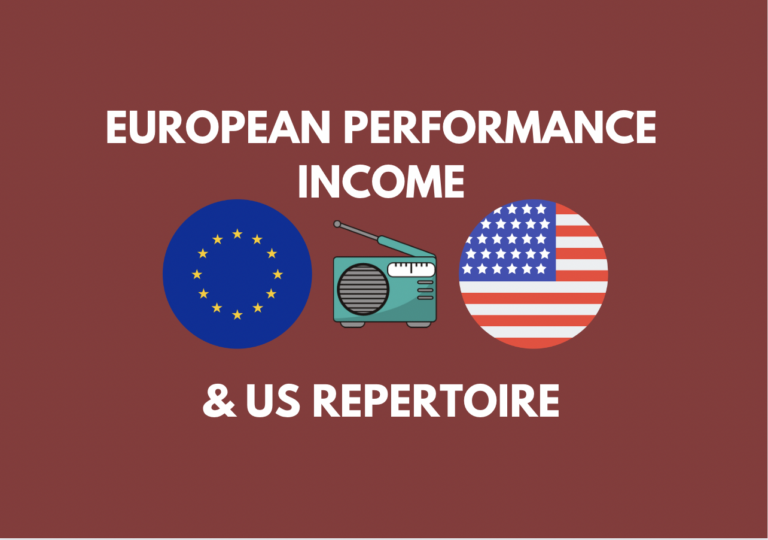AHEAD OF EUROPEAN ELECTIONS, ARTISTS AND LABELS URGE EC TO “GET ITS HOUSE IN ORDER” ON BROADCAST AND PERFORMANCE MONIES BEING TRANSFERRED AWAY FROM EUROPE

Brussels, 8th April 2024
With only two months to go before the European elections, artists and labels from across Europe are joining forces again and calling on the European Commission to come forward with a clear proposal to address the consequences of the EU “RAAP” case regarding terrestrial broadcast and public performance rights.
In the RAAP judgment of 2020, the Court of Justice of the EU indicated that the Directive dealing with the public performance rights of music performers and producers could be amended to confirm the longstanding principle of reciprocity deriving from the international copyright treaties.
This approach would maintain EU trade pressure and stop the annual transfer of 125m Euros away from the European music sector to the USA and other countries which do not provide these basic protections in their national copyright law. This can be done in a proportionate way with a harmonised framework which also accommodates countries that currently apply another system.
The European Commission has said that it recognised the problem and the music sector, EU governments and members of the European parliament have on many occasions flagged the need to address this urgently. A clear sign is needed that this is going to happen before the end of the current European Commission’s mandate, almost four years after the ruling has been delivered.
Helen Smith, Executive Chair of IMPALA (European association of independent music companies), said: “With the end of the current EU legislature now just weeks away, we want to remind decision makers to “get their house in order”. Responsibility for this lies with the current commission, not the next. If we can get results on AI, we can do it on RAAP. A proposal is needed now to restore legal certainty and prevent European artists and producers losing more than €1bn over the next decade to the USA, which has chosen not to protect these rights”.
MEP Tomasz Frankowski, European Parliament, commented: “The European Commission is responsible for addressing this situation within a reasonable timeframe. Together with several of my colleagues, we have been keeping a close eye on the process and have asked the Commission on several occasions how they planned to address this. Concerns have been acknowledged but now is the time for action. We owe this to our artists and music SMEs”.
Will Maas, Chairman Ntb/Kunstenbond (Dutch musicians’ union) continued: “If nothing is done soon, revenues going to European artists will continue to drop significantly, to the point where many will no longer be able to make a living from their music. Action is needed now, this is a no-brainer, doing nothing is like shooting ourselves in the foot when the EU should be doing everything it can to guarantee its sovereignty and safeguard cultural diversity”.
Helen Smith concluded: “There is a growing body of legal opinions coming from different parts of Europe confirming that the legislation can be clarified in a proportionate way that would promote harmonisation while taking into account the diversity of national approaches, as with other points of copyright. European artists and producers are asking for this, European governments are asking for this, the European Parliament is asking for this, now it is time for the European Commission to come forward with a balanced solution. Alongside this, we also ask the EC to prioritise trade pressure on the USA to introduce these basic protections in their domestic legislation”.
Today’s call from European artists and independent labels comes ahead of two important milestones on the EU’s copyright agenda: the next meeting of the Council of the EU’s working party on copyright, taking place on 10th April in Brussels, where the RAAP case will be discussed, and the next meeting of EU Culture Ministers on 13th May. Our call also coincides with the Belgian EU Presidency Copyright Conference, taking place 8-9th April in Namur, focused on the remuneration of authors and performers in the creative industries.
Signatories
- Adami – French collective management organisation for performers’ rights
- Creo – Norwegian union for arts and culture
- Dansk Artist Forbund – Danish Artist Union
- Dansk Musiker Forbund – Danish Musicians Union
- De Muziekgilde – Association of musicians and producing DJ’s residing in the Dutch speaking part of Belgium
- FACIR – Belgian Federation of authors, composers and performers
- IMPALA – European association of independent music companies
- Musikerförbundet – Swedish Musicians’ Union
- Ntb/Kunstenbond – Dutch Musicians’ Union
- PlayRight – Belgian collective management society of neighbouring rights for performing artists
- SAMI – Swedish Artists’ and Musicians’ Interest Organisation
- SYMF – Swedish Union of Professional Musicians
- unisono – German Federation of Musicians
About IMPALA
IMPALA was established in 2000 and now represents over 6000 independent music companies in Europe. 99% of Europe’s music companies are small, micro and medium businesses and self-releasing artists. Known as the independents, they are world leaders in terms of innovation and discovering new music and artists – they produce more than 80% of all new releases and account for 80% of the sector’s jobs. IMPALA’s mission is to grow the independent music sector sustainably, return more value to artists, promote diversity and entrepreneurship, improve political access, inspire change, and increase access to finance. IMPALA works on a range of key issues for its members, runs various award schemes and has a programme aimed at businesses who want to develop a strategic relationship with the European independent sector – Friends of IMPALA.
